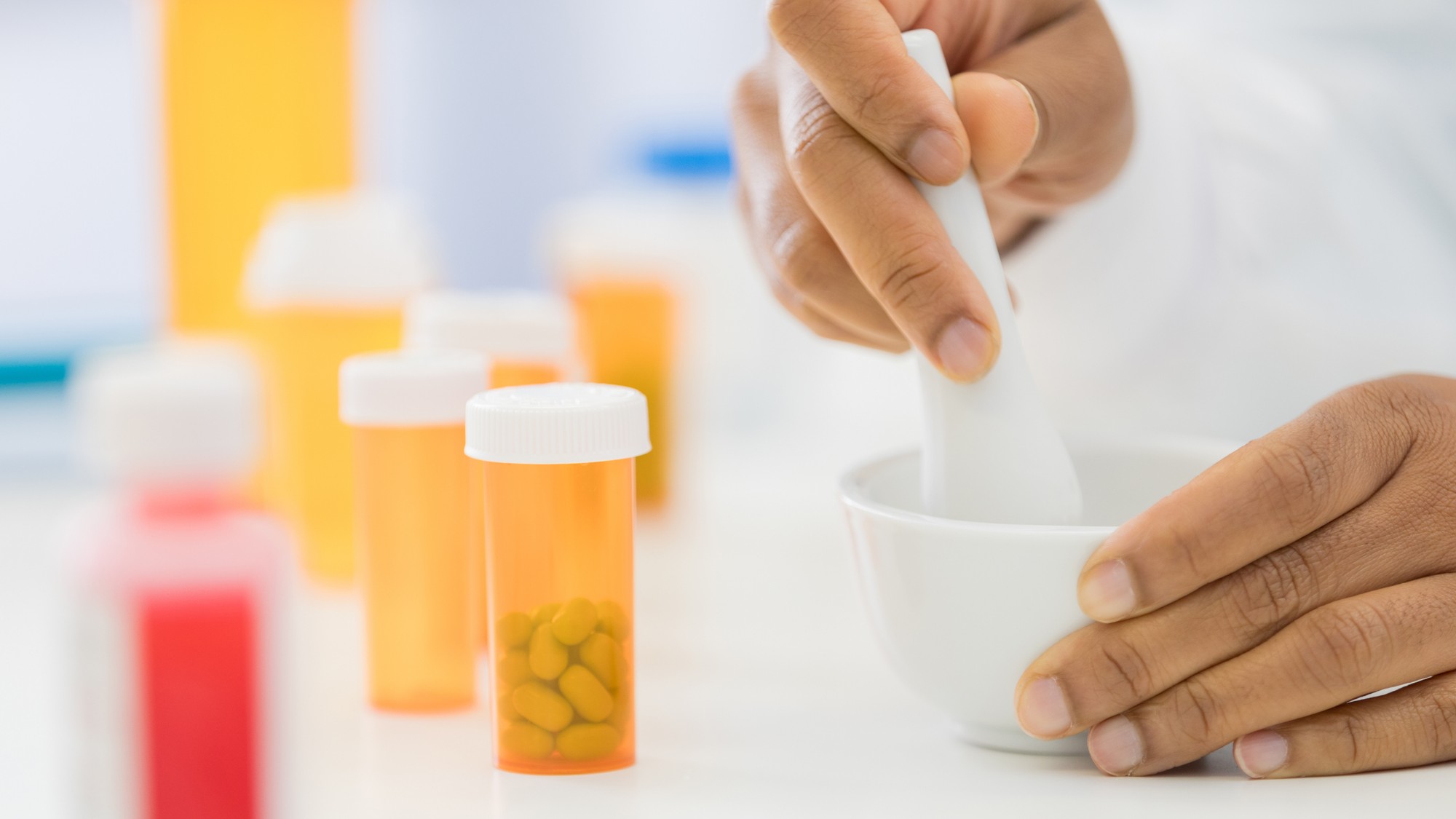The pros and cons of compounding pharmacies
Customizing medications can be lifesaving and also dangerous


A free daily email with the biggest news stories of the day – and the best features from TheWeek.com
You are now subscribed
Your newsletter sign-up was successful
Compounding pharmacies are facilities that are able to make customized medications. This could be to alter a drug's dosage or composition for medical purposes. Many patients have benefitted from drug compounding, especially those suffering from allergies to certain drug ingredients. Nonetheless, these facilities have been steeped in controversy, as many have formulated knockoffs of the weight-loss drugs Ozempic and Wegovy with a different active ingredient that has not been used in other FDA-approved medications. Compounding pharmacies can be lifesaving for many but can also be dangerous if standards aren't met. Also, the quality of facilities can vary widely.
Pro: Provide meds you can't find at regular pharmacies
Compounded drugs provide more customization options for both dosage and composition. Doctors can prescribe a compounded drug to alter the dosage, add appealing flavor if intended for a child or pet, alter the form of the medication or remove ingredients like allergens, according to WebMD. For certain medical needs, compounding pharmacies might be the only option because the FDA-approved version of the necessary drug may not be suitable for certain patients. For example, a compounded drug can be "vital to the geriatric patient or a child who cannot swallow a pill and needs a medicine in a liquid form that is not readily available," explained U.S. Pharmacist.
Con: Cause potential problems in drug quality
While compounding facilities do need to maintain the same manufacturing standards as traditional drug manufacturers, they do not face the regulatory standards that commercial drug manufacturers do. "There are reports of compounding pharmacies sourcing ingredients through various 'grey market' channels of varying quality," Derek Lowe wrote in a piece for Chemistry World. "Some of these are legitimate drug lots resold by middlemen (through transactions of variable legality!), but others are manufactured by facilities that aren't approved as suppliers in the pharmacies' own countries." Different states have different laws and regulations regarding compounding facilities, so the quality of medicines can vary greatly. "Poor compounding practices can result in serious drug quality problems, such as contamination or a drug that contains too much active ingredient," the U.S. Food and Drug Administration (FDA) added.
The Week
Escape your echo chamber. Get the facts behind the news, plus analysis from multiple perspectives.

Sign up for The Week's Free Newsletters
From our morning news briefing to a weekly Good News Newsletter, get the best of The Week delivered directly to your inbox.
From our morning news briefing to a weekly Good News Newsletter, get the best of The Week delivered directly to your inbox.
Pro: More affordable
While the price of compounded medications is quite varied, pharmacies could make some medications more affordable by altering the formulas' ingredients. For example, a compounding pharmacy is capable of "producing medication at a different, less expensive dosage than a retail pharmacy," according to Health Dimensions. Some have called compounded drugs a "boon for patients" because the patients can pay "a third of what they would for brand-name products," Medscape explained. This can be life-changing for patients who struggle to afford medication and now have an economical alternative that can be equally effective.
Con: Regulated differently than FDA-regulated drugs
The comparative lack of regulation is a major concern for those who oppose compounded pharmacies. "Compounded drugs pose a higher risk to patients than FDA-approved drugs because they do not undergo FDA premarket review for safety, effectiveness, or quality," the FDA detailed, adding that compounded drugs also lack an FDA finding of manufacturing quality before such drugs are marketed. This largely leaves compounded pharmacies to use their own discretion in making drugs. "There are a lot of great compounding pharmacies out there that take great patient care every single day," said Betty Jones, compliance senior manager of accreditation and inspection programs at the National Association of Boards of Pharmacy told The New York Times. "But there are [also] some of those bad actors."
Pro: Helps to alleviate impacts of drug shortages
Sometimes the FDA taps compounders to help produce drugs that are facing a shortage. "Almost every time there is a fear of some new shortage, we turn immediately to the compounders and say, 'What do you have for our needs for this?'" said Eric Tichy, who leads the medical supply chain at Mayo Clinic, to the Wall Street Journal. Having the option to compound medications can reduce pressure on drug manufacturers, especially when a medication, like Ozempic, is in high demand. "They're not trying to make a million bucks doing this," Tenille Davis, a compounding pharmacist in Arizona, told The New York Times. "They're trying to meet an intense, overwhelming patient and provider demand for this product." The Journal added, "Having a steady supply of drugs, compounded or not, means healthcare providers are less likely to ration drugs, and patients are less likely to miss treatments."
Con: Leads to potential deaths
"Some compounding pharmacies and drug preparers may make misleading statements about the safety or efficacy of compounded drugs," WebMD explained. "If the mixture is contaminated, it can injure or kill people." The methods used in compounding pharmacies increase the risk of the drug formulation going awry. "Compounding pharmacies tend to use less automation," which can, according to Medscape, "increase the chance for errors with potency or contamination, including lapses in sterilization." This occurred at the New England Compounding Center in 2012, where several patients contracted fungal meningitis from a compounded epidural steroid injection that had been contaminated.
A free daily email with the biggest news stories of the day – and the best features from TheWeek.com
Devika Rao has worked as a staff writer at The Week since 2022, covering science, the environment, climate and business. She previously worked as a policy associate for a nonprofit organization advocating for environmental action from a business perspective.
-
 How the FCC’s ‘equal time’ rule works
How the FCC’s ‘equal time’ rule worksIn the Spotlight The law is at the heart of the Colbert-CBS conflict
-
 What is the endgame in the DHS shutdown?
What is the endgame in the DHS shutdown?Today’s Big Question Democrats want to rein in ICE’s immigration crackdown
-
 ‘Poor time management isn’t just an inconvenience’
‘Poor time management isn’t just an inconvenience’Instant Opinion Opinion, comment and editorials of the day
-
 Scientists are worried about amoebas
Scientists are worried about amoebasUnder the radar Small and very mighty
-
 Metal-based compounds may be the future of antibiotics
Metal-based compounds may be the future of antibioticsUnder the radar Robots can help develop them
-
 A fentanyl vaccine may be on the horizon
A fentanyl vaccine may be on the horizonUnder the radar Taking a serious jab at the opioid epidemic
-
 Stopping GLP-1s raises complicated questions for pregnancy
Stopping GLP-1s raises complicated questions for pregnancyThe Explainer Stopping the medication could be risky during pregnancy, but there is more to the story to be uncovered
-
 Nitazene is quietly increasing opioid deaths
Nitazene is quietly increasing opioid deathsThe explainer The drug is usually consumed accidentally
-
 Tips for surviving loneliness during the holiday season — with or without people
Tips for surviving loneliness during the holiday season — with or without peoplethe week recommends Solitude is different from loneliness
-
 More women are using more testosterone despite limited research
More women are using more testosterone despite limited researchThe explainer There is no FDA-approved testosterone product for women
-
 Peanut allergies have plummeted in children
Peanut allergies have plummeted in childrenUnder the radar Early introduction could be an effective prevention method
